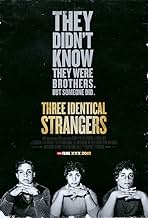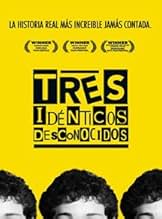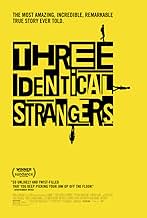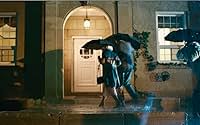In 1980 New York, three young men who were all adopted meet each other and find out they're triplets who were separated at birth. But their quest to find out why turns into a bizarre and sin... Read allIn 1980 New York, three young men who were all adopted meet each other and find out they're triplets who were separated at birth. But their quest to find out why turns into a bizarre and sinister mystery.In 1980 New York, three young men who were all adopted meet each other and find out they're triplets who were separated at birth. But their quest to find out why turns into a bizarre and sinister mystery.
- Director
- Writers
- Stars
- Nominated for 3 Primetime Emmys
- 12 wins & 58 nominations total
- Self
- (as Bobby Shafran)
- Self
- (archive footage)
- Self
- (archive footage)
- Self - President, Louise Wise Services
- (archive footage)
- Director
- Writers
- All cast & crew
- Production, box office & more at IMDbPro
Featured reviews
And these are the murky waters charted by director Tim Wardle's Three Identical Strangers, presenting a bizarre stranger-than-fiction story, which begins as a light-hearted human-interest piece before taking several darker turns. However, for me, although the fascinating central story is undoubtedly gripping, there are just too many egregious problems in the telling, including an excess of distasteful sensationalism; a dearth of contextualising scientific information; overly simplistic ethical, moral, philosophical, and esoteric conclusions; stylistic drabness; and, an overreliance on plot twists, which often forces the filmmakers to manipulate the material beyond what you would expect of a documentary.
The film tells the story of Bobby Shafran, Eddy Gallan, and David Kellman, three young men in New York, who, through luck and coincidence learn they are triplets who had been separated as babies. Upon meeting, they quickly bond, move into an apartment together, and open a restaurant in New York, Triplets Roumanian Steak House. Becoming minor celebrities, they appear on talk shows across the country and have a cameo in Recherche Susan désespérément (1985). However, they and their families are puzzled as to why they had been separated, and why their adoptive parents had not been told they were triplets. Was it a coincidence that Bobby had been placed with an affluent family, Eddy with a middle-class family, and David with a blue-collar family? Did the regular aptitude and psychological tests they received as children, part of what their parents were told was a "routine childhood-development study", have anything to do with their separation? What was the involvement of one of the country's largest social service agencies, the Jewish Board of Family and Children's Services? How much did New York's most preeminent Jewish adoption agency, Louise Wise Services, know? How was Dr. Peter B. Neubauer of the Jewish Board's Child Development Centre in Manhattan involved? How did the triplets' birth mother fit into what happened? As they begin to investigate, they soon stumble upon a series of shocking secrets that would change their lives, and the lives of many others, forever.
A noticeable structural element concerns what Wardle and editor Michael Harte referred to at a Q&A after a screening in Dublin as a "past tense" and a "present tense". The past tense section covers roughly the first half of the film, running up to the end of the first round of interviews, which were conducted from 2011-2015. The present tense section then picks up in 2016. The transition between the two is pretty obvious, but it's worth mentioning as it's not something you usually see in a documentary. Half-way through the film, Wardle thanks Bobby and David, who are being interviewed separately, and they say goodbye, get up, and leave the room. It's very unusual to see a documentary film drawing attention to its own artifice in this manner - the furthest most will go will be to include the interviewer's voice, but even that is relatively rare. By featuring a scene like this, especially so early in the film, Wardle and Harte are alerting the audience to the fact that something has changed, and from here on out, things are going to be in a different register.
The film has two major themes; morality/ethics and nature vs. nurture. In terms of morality, Wardle has referred to the scientists behind splitting the triplets up as succumbing to "noble cause corruption", arguing that they probably set out to accomplish something laudable, but were not above using unethical means to do so. It does, however, seem strange that when examining the morality of what was done to the brothers, Wardle makes no mention of David Reimer, a male who was reassigned as a girl in 1965 when he was only a few months old and raised female, based upon dishonest advice given to his parents by psychologist John Money, who was attempting to prove that gender identity is learned. As there are a lot of parallels between the brothers' stories and Reimer's, and between Neubauer and Money, including a reference or two would have helped contextualise things.
As to the question of nature vs. nurture, initially, events seem to point very much to nature - the brothers all smoked the same brand of cigarettes; they had all been amateur wrestlers; they had the same taste in women; they had similar speech patterns. The media at the time ate this up, with their appearances on talk shows designed to leave the audience stunned at their similarities. However, as the documentary goes on, the argument shifts, with the brothers themselves admitting they emphasised their similarities at the time, and the media was more than happy to ignore any differences, leading to what was apparently a clear win for biological determinism. As time went on, their differences began coming to the surface, and ultimately, the documentary very much argues in favour of nurture.
However, how it goes about establishing this argument is extremely questionable, with Wardle sliding more and more into sensationalism. So intent is he on controlling our perceptions that he leaves out a massive piece of information until such time as he deems it pertinent to reveal, and when he does so, he explicitly tells us what to think about it, pushing us to one specific response, when the event cries out for a more ambiguous presentation. It's difficult to go into any of this without straying into spoilers, so consider the rest of this paragraph a spoiler. Essentially, Wardle paints the suicide of one of the brothers as unquestionably the result of his adopted father's harsh disciplinarian parenting, a father who is still alive, and who appears in the film. Wardle and Harte do this by cutting from a clip of that father wondering if he had a role in the suicide to one of the other brothers basically saying, to paraphrase, "I'm still alive because my parents weren't as strict as his." Blaming his death entirely on parenting in this manner is facile, grossly overly simplistic, and offensive. In fact, the way Wardle handles the suicide in general is deplorable, teasing it and teasing it, before gleefully revealing it for maximum tabloid-esque shock value. The sense of Wardle manipulating the material isn't helped by the fact that the absence of the third brother from the talking head interviews tips off the audience from the get-go as to where the story is heading. Why not just state it right up front, cutting back on the silly twist element of the narrative? It's not like people would get up and walk out upon seeing a "spoiler" like that at the outset.
There are other problems, however. Aesthetically, the documentary is drab and dull, almost lifeless. With nothing cinematic about it whatsoever, it could easily be a report from a TV news magazine show, designed for maximum exposure rather than artistic inventiveness. The recreations are bland, and the talking head interviews are flat. Additionally, twin studies are a recognised and accepted scientific practice, but Wardle is so intent on making sure we are appalled at what happened to the brothers that he provides almost no context whatsoever. If he had spent less time trying to steer the viewers' emotions and more in providing a broader theoretical framework, the film would have worked much better, allowing the audience to find their own position in relation to what was done rather than simply following the director's lead. He also ignores a great deal of potentially interesting material. For example, why did their restaurant fail? Indeed, we never really get any sense of what the brothers' day-to-day life was like after they found each other. When they moved in together, how did that feel, for example? It's as if he doesn't want to dig too deep into anything just in case he finds something that might not fit into the grand narrative he's constructing.
The story of Three Identical Strangers poses fascinating questions about nature vs. nurture and the morality of certain types of research, but the film is so intent on the "nurture" answer that Wardle's subjective opinion comes across far more than it ought. More interested in driving home the shock value of some of the events than providing a penetrating documentary about free will vs biological determinism, there is little here that a reader wouldn't be able to find on Google. Given the outrageousness of the material, that Wardle has made such a conventional film is disappointing. It's an interesting enough piece, but that's more to do with the fascinating subject than the presentation.
The story is told quite sequentially, and, again, that is in service of providing more drama as the Doc unfolds. Because the events go back to the 60s, many of the participants aren't around any longer to speak for themselves. Still, Wardle and his team managed to assemble a good cross-section of survivors to go on the record. Because the story was such a cause celebre in the early 80s (and in the NYC area to boot) we are also able to see a decent amount of historical footage of the triplets and their rise to fame including trips to the Today show, Donahue and a brief cameo in Susan Seidelman's DESPERATELY SEEKING SUSAN (supposedly at the behest of star Madonna). Some fairly minor dramatic re-enactments are also employed, and aren't distracting (Wardle also maintains the proper aspect ratio in much of the vintage footage - to his credit).
As the true tale turns darker, a few issues with the filmmaking arrive. I won't delve into spoilers (I avoided them myself in order for the Doc to have maximum impact), but, the old Nurture vs. Nature debate becomes a key point of contention - as it does with all of these 'separated at birth' cases. Because of the way Wardle structures his editing, we mostly get the 'Nature' perspective until very late in the process. Further, a major cache of evidence is dropped in at the very last moment, and isn't sufficiently analyzed. It's understood that after five years in the making, Wardle, Raw, Neon and other production entities wanted to get their movie done and released, but one can't help but feel the editing was wrapped up in order to get a prized Sundance Film Festival spot. Wardle also includes a couple of curious montages repeating what we've seen earlier as if he had an eye on TV showings (CNN is set to show it). But, these problems pale compared to Wardle's casting a light on some highly unethical behavior that effected the triplets' lives.
These relatively minor issues aside, THREE IDENTICAL STRANGERS again shows why there is a bit of Documentary boom going on. In a cinema dominated by Superhero and Animated flicks, there is a yearning among some adults for movies of substance and reality. STRANGERS is a true emotional roller-coaster.
Yes, things do not all turn well after the initial exaltation over their finding each other. The doc expertly distributes the dark revelations as if we were their friends slowly learning astonishing facts about the triplets from separation to owning a restaurant called, what else, Triplets. Not only do we see the nuances of differences among the triplets, but we also get tantalizing looks into the machinery of adoption, not all happy to be sure.
As adults, Robert Sheridan, David Kellman, and Eddy Galland are outgoing and articulate (only two are talking heads, while Eddy's part is archival footage). Good for director Wardle letting them tell the story without prompting, for effective docs mostly let the camera roll and the subject talk. This doc will grab you and not let you go-you'll hunger for more.
As the background of the adoption and the testimony reveals startling information, our natural inclination is to contrast the three different social backgrounds to see the effects of nature vs. nurture. Indeed social scientists are here plying their trade, sometimes in unethical ways yet food for the thriller part of this engrossing film.
Although the nature/nurture debate is never fully deconstructed, I was pleased with the taste of it, as most social scientists must be in such a delicious dramatic stew. I'm done writing for fear of spoiling one of the delights of this documentary: What comes next?
Don't even Google because you can find the details there. Most desirable is to witness how artfully through excellent film you can find in reality that truth can be stranger than fiction. And definitely not fake.
Three Identical Strangers is one of the year's best documentaries. It has it all but the definitive answer to the central mystery. Learn more by seeing it, not Googling it.
Did you know
- TriviaThe movie that the triplets had a cameo in is Recherche Susan désespérément (1985).
- GoofsBobby owned a 1970 Volvo. In archive footage it's shown to be a Volvo 164 but in the reenactment scenes set in 1980 it's a newer Volvo 244.
- Quotes
Robert Shafran: When I tell people my story, they don't believe it. I guess I wouldn't believe the story if someone else were telling it, but , I'm telling it and it's true, every word of it.
- ConnectionsFeatured in WatchMojo: Top 10 Movies You Missed This Summer (2018)
- SoundtracksSince You Been Gone
Written by Russ Ballard
Performed by Rainbow
Published by Union Square Music Songs Ltd., a BMG Company
Courtesy of Polydor Records (US)
Under license from Universal Music Operations Ltd.
- How long is Three Identical Strangers?Powered by Alexa
Details
- Release date
- Countries of origin
- Official sites
- Language
- Also known as
- Vidas separadas
- Filming locations
- Production company
- See more company credits at IMDbPro
Box office
- Gross US & Canada
- $12,320,845
- Opening weekend US & Canada
- $171,503
- Jul 1, 2018
- Gross worldwide
- $13,448,497
- Runtime1 hour 36 minutes
- Color
- Aspect ratio
- 1.85 : 1
Contribute to this page


![Watch Three Identical Strangers [Official Trailer]](https://m.media-amazon.com/images/M/MV5BZGIxNjBjYWUtYzExYS00NGFhLTkwYmQtZTZkNTcxYTY5ZTQ1XkEyXkFqcGdeQXRzdGFzaWVr._V1_QL75_UX500_CR0)





































